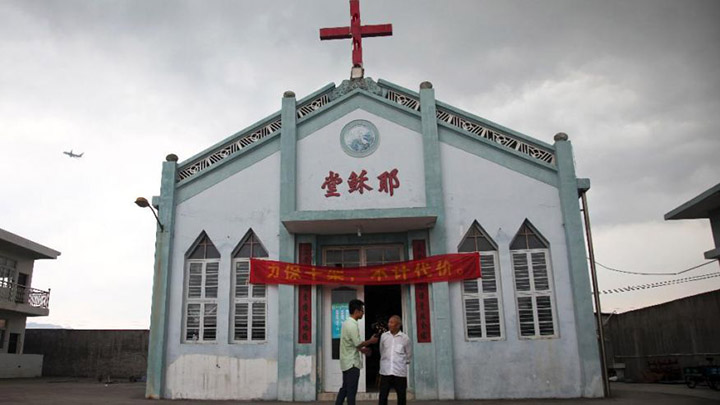
In this photo taken July 15, 2014, Pastor Tao Chongyin, left, speaks with church member Fan Liang'an in front of the Wuxi Christian Church with the words
Crosses have been removed from at least three places of worship in China this month, dashing hopes that the government's demolition campaign targeting Christian churches had ended.
Last month, Chinese Bishop Paul Meng Qinglu said that Beijing had ordered an end to the campaign, which saw the demolition of at least 400 churches in the eastern province of Zhejiang in 2014.
However, Bishop Qinglu's assertions were proven false when, on April 2, authorities removed the cross from a church in Cixi, a city of around 105 miles south of Shanghai, the Telegraph reports. Then, a cross was removed from the roof of the En Quan church in the neighbouring city of Ningbo, and a short time later, a third church, Qingyian Youzhu, was targeted in Lishui, another city in Zhejiang.
"I never believed in that order [to end the campaign]," said Zhang Mingxuan, the head of the Chinese House Church Alliance.
The recent demolitions are a sign that "this evil campaign continues," said Bob Fu, the head of China Aid, a US-based Christian campaigning group. "This ought to stop if China wants to earn the respect of the international community."
According to the New York Times, the targeting of believers in Zhejiang, one of China's wealthiest provinces, highlights the Chinese leadership's discomfort with the growing allure of Christianity, whose followers are said to rival in number the 86 million members of the Communist Party. Despite hostility from the authorities, Christianity is flourishing in China and remains the country's fastest growing religion.
Many of last year's demolitions and cross removals took place in Wenzhou, a major coastal city often referred to as the "Jerusalem of the East" because of its large Christian population.
In March, Chinese pastor Huang Yizi was sentenced to a year in prison for protesting the removal of a cross from his church, Fengwo Church in Wenzhou. As previously reported by the Gospel Herald, scuffles between police and protesters resulted in one member of the congregation suffering a fractured skull.
According to the AFP, Huang urged church leaders to replace removed crosses and criticized police violence on his blog, describing what was happening as "severe persecution". A short time later, Huang's lawyer, Zhang Kai, told the Associated Press via telephone that his client was found "guilty of gathering crowds to disrupt social order."
While Christians believe the demolitions are deliberate attacks on their faith, Chinese officials claim the campaign is an attempt to rid the region of "illegal structures" and has nothing to do with religion.
"There is no such thing [as an anti-church campaign]," one official was quoted as saying by state media last year.














